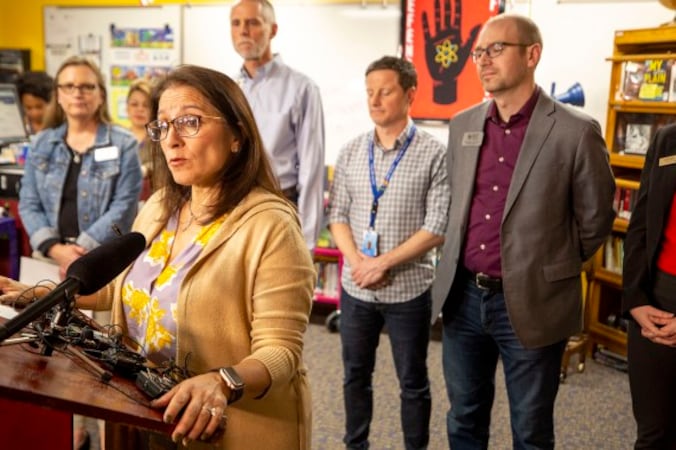Outgoing Denver Superintendent Susana Cordova has been gracious in her comments about leaving the district where she was once a student and has spent her entire career. She has said an opportunity arose in Texas that she decided to take.
“I feel like I have learned a lot in the Denver Public Schools and have a lot to offer, but I’m also very excited to learn a lot in a new place,” Cordova said Friday.
However, some of her supporters have pointed to her relationship with the seven-member Denver school board as a catalyst for her departure. All seven board members declined interviews this week. But one member refuted that theory on a Facebook Live talk show.
“I want to, real quick, clear up a rumor that has been going around that this board has tried to push Susana out,” board member Tay Anderson said Monday on a show hosted by community activist Brother Jeff Fard. “That’s false.” Just because some board members “have different political opinions in education than Susana” does not mean they pushed her out, he said.
Cordova’s August performance evaluation — the only one she got from the school board in slightly less than two years on the job — provides some insight into what board members perceived as those differences and how they hoped Cordova would respond.
The evaluation does not signal that the board was about to fire Cordova. But it does convey that the board wanted her to lead the district in a new direction, away from the reform strategies of the previous administration, the most controversial of which involved closing schools with low standardized test scores and sometimes replacing them with charter schools.
“The superintendent will have a partner and constructive friend in the board of education if and as she addresses the key opportunity areas,” the evaluation says. “We are confident the superintendent has the requisite competence and skills to do so.”
Anderson said the board learned of Cordova’s resignation on Thursday night, less than 24 hours before she announced it publicly Friday afternoon. A statement issued by the board on Sunday indicates board members were surprised by her departure.
“While she has had time to plan for this change, the board of education has not,” it says.
The job of superintendent is inherently political and requires those who hold it to navigate competing interests. Joshua Starr, a former superintendent in Connecticut and Maryland who now heads the teacher membership organization PDK International, said one of the unwritten rules of superintendency is to “get out before they push you out.”
It’s also not uncommon for outgoing superintendents — especially women — to resign with nothing but kind words, said Julia Rafal-Baer, the chief operating officer for Chiefs for Change, an organization of state and district education leaders of which Cordova was a member.
“In a job so public, you have to be careful about how that exit goes,” Rafal-Baer said. “We don’t often get to hear the real story about what’s really gone on.”
Cordova’s time as superintendent was marked by crises. She weathered a three-day teachers’ strike, a downsizing of the central office to pay for teacher raises, and the COVID-19 pandemic.
Largely because of the pandemic, the school board did not set broad district priorities this year, nor approve a set of goals for the superintendent. In lieu of measuring Cordova against agreed-upon goals, the board evaluated her on her “core values” and whether she would be able to “lead the district in a new direction.”
They also gave her an overall score: 3 out of 5.
Among her strengths, board members noted her “steady leadership” under fire. Cordova is a Denver high school graduate who took a job as a teacher in the district in 1989, and they wrote of “the importance of having a homegrown, bilingual superintendent who is a former educator.” They praised her listening skills and her “high functioning and respectful” leadership team.
But they also criticized Cordova’s team — if not the superintendent herself — for being “too attached to the direction of the former administration.”
The evaluation says that while the board agreed with Cordova’s focus on equity and quality teaching, “the opportunities for growth lie in a compelling long-term vision and aggressive plan to shift the culture away from the shortcomings of the former ‘reform’ narrative.”
The evaluation lays out the board’s specific vision for how to get there, including eschewing competition between schools, which is most visible through Denver’s school choice process, further shrinking the central office to push more dollars directly to schools, and de-emphasizing standardized testing. It conveys that the board expected Cordova to deliver.
“Ultimately, the board of education recognizes that we need each other — board and superintendent — to successfully lead toward a reality of ‘every child succeeds,’” it says.
Cordova never publicly disagreed with the board’s vision, though her staff sometimes made recommendations on controversial topics such as charter schools that the board ended up rejecting or revising. Cordova always took a collaborative approach, and her evaluation notes she was “very graceful and professional in tense and chaotic circumstances.”
But observers say that doesn’t mean there weren’t disagreements.
“Publicly, it’s hard to see the light between the board and her because of the way she is,” said Van Schoales, executive director of education advocacy organization A Plus Colorado. “But it doesn’t mean there wasn’t enormous light.”
Cordova does not not have a firm exit date but pledged Friday to work with the board “over the coming weeks to ensure a smooth transition.” Board President Carrie Olson said in a statement Monday that the board met privately to discuss a timeline for selecting an interim leader.
“All of our time, energy, and focus will be dedicated to this endeavor by Dec. 17,” the statement says. “Announcements forthcoming.”







